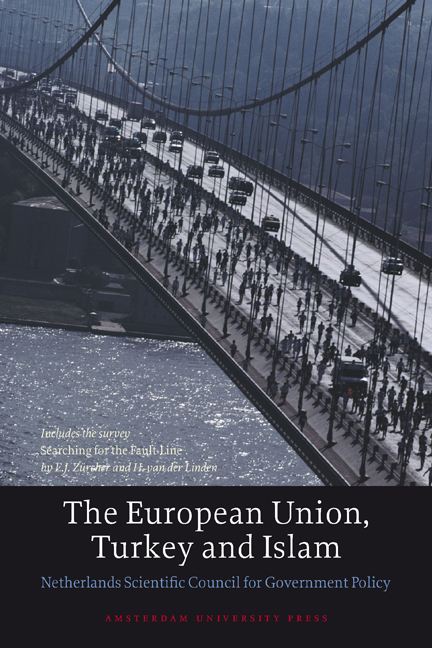Book contents
- Frontmatter
- Contents
- Summary
- Preface
- 1 Introduction
- 2 The European Union and Religion
- 3 Turkish Islam and the European Union
- 4 Conclusions
- Epilogue
- Literature
- Searching for the Fault-Line
- 5 Introduction: Turkey – Fault-Line, Frontline or Test Case?
- 6 Turkey’S Current Islamic Landscape
- 7 Turkish Islam and the Eu: a Clash of Civilisations?
- 8 Conclusion: Turkish Islam and European Civilisation
- Literature
- Websites
Summary
Published online by Cambridge University Press: 14 January 2021
- Frontmatter
- Contents
- Summary
- Preface
- 1 Introduction
- 2 The European Union and Religion
- 3 Turkish Islam and the European Union
- 4 Conclusions
- Epilogue
- Literature
- Searching for the Fault-Line
- 5 Introduction: Turkey – Fault-Line, Frontline or Test Case?
- 6 Turkey’S Current Islamic Landscape
- 7 Turkish Islam and the Eu: a Clash of Civilisations?
- 8 Conclusion: Turkish Islam and European Civilisation
- Literature
- Websites
Summary
Officially, Islam does not play a role in the decision whether to accept Turkey as a member state of the European Union (EU). Yet many people wonder if a Muslim country such as Turkey would really fit into the European Union. Is Turkish Islam compatible with democracy, human rights and the separation of state and religion? The central question of this report, therefore, is whether the fact that the majority of its population is Muslim forms a hindrance to Turkish accession to the European Union.
This report is a full translation of De Europese Unie, Turkije en de islam, that was officially presented to the Dutch government on 21 June 2004 by the Netherlands Scientific Council for Government Policy. The Council is an independent advisory body for the Dutch government which provides sollicited and unsollicited advise on developments which may affect society in the long term (see also: www.WRR.nl).
Reason
The question examined in this report is highly relevant, given the decision to be taken by the EU under the Dutch Presidency in December 2004. It will then be decided whether candidate member state Turkey has made sufficient progress towards meeting the so-called political Copenhagen criterion that accession negotiations can commence. This criterion stipulates a stable democracy and a constitutional state that guarantees the rule of law, human rights and the rights of minorities.
Religion as such plays no role in this Copenhagen criterion. The fact that the majority of the Turkish population is Muslim, therefore, played no formal role in the decision taken in 1999 to grant Turkey the status of candidate member. However, especially since the terrorist attacks on 11 September 2001, the concerns in member states about Islam and Muslims have increased. This has contributed to growing doubts over the question whether Turkey's Islamic character is compatible with the political achievements of the EUand its member states. Objections to membership, on cultural and religious ground, have been increasingly raised, even in political circles.
Objective of the report
In light of these recent discussions, the Netherlands Scientific Council for Government Policy (henceforth identified by the initials of its Dutch title – the WRR) considers it important to have a separate review of the question whether Turkish Islam is compatible with the values upon which the Union is based. In this way, the WRR hopes to contribute to the formulation of an informed judgement .
- Type
- Chapter
- Information
- The European Union, Turkey and Islam , pp. 5 - 12Publisher: Amsterdam University PressPrint publication year: 2004
- 1
- Cited by



